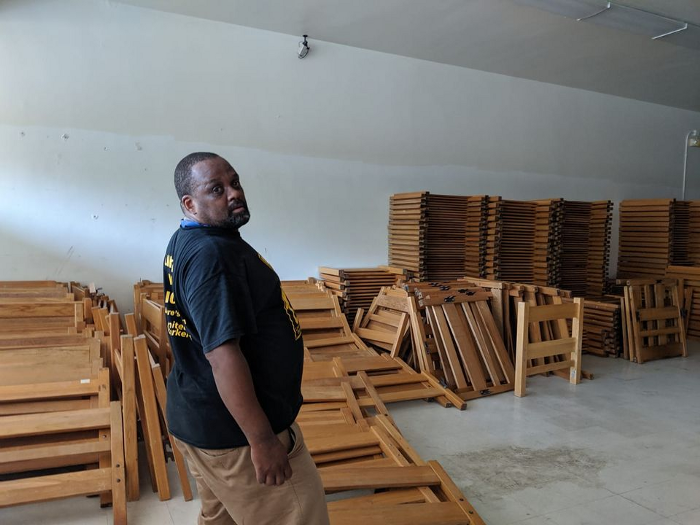By Andrea L Stennett
Damien Haussling’s organization, Baltimore Furniture Bank (BFB), fills the need of free furniture during challenging times. Like many social impact initiatives over the last year, Baltimore Furniture Bank has had to adapt and respond to shifting community needs. BFB’s ‘Baltimore Kids in Need of Desks’ (BKIND) campaign started with a phone call from the American University offering 2,000 pieces of dorm furniture, and has since transformed into a COVID-19 responsive initiative helping families receive, and create, learning spaces at home.
Baltimore Furniture Bank started in 2019 with help from Fusion Partnerships. The organization collects gently used furniture from universities, businesses, and the public, to redistribute free of charge to people in need of furniture. In hindsight, BFB launched at a uniquely fortuitous time in history, although the idea for a furniture bank came years prior when Damien served as an AmeriCorps Vista coordinator for the homeless population in Baltimore City.
At the time, his desk was in the offices of ‘Word on the Street,’ an independent newspaper led by those with experiences of homelessness and poverty, which Damien has experienced himself. Damien’s work with AmeriCorps helped him acquire housing with friends:
“My roommate and I had developed a very good, large circle of friends, and most of these friends were closer to the middle class who maybe had more resources. So, when we were getting into a house, we had people crawling out of the woodworks with offers of free furniture…. I realized…that our friends tend to be more like us. Somebody who is experiencing homelessness has generally been mostly poor throughout their life and probably won’t have those resources. That’s when we thought, ‘Oh there has got to be some kind of furniture bank,’ and were shocked there wasn’t.”
According to Healthcare for the Homeless, nearly ½ of residents in Baltimore City live 200% below the federal poverty line and ⅓ of children live in poor households. Further, over half of Baltimore renters are living in housing they cannot afford, and may not have the disposable income to buy new furniture (The Journey Home). As of January 2020, 2,193 people in the city are estimated to be homeless (defined as those who are unsheltered, in emergency shelters, or in transitional housing) on any given night (Baltimore City 2020 Point-in-Time Count). This number is expected to drastically increase: the United States faces a looming eviction crisis due to COVID-19. Experts from The Aspen Institute anticipate the eviction crisis will affect 30–40 million Americans, most of whom will be from communities of color.
For folks like Damien who have overcome the initial hurdle of securing housing, finding resources for furniture can be another significant barrier to financial stability. A few years after his position with AmeriCorps, Damien put his idea to paper and was selected as one of Open Society Institute’s 2019 Community Fellows. The fellowship allowed Damien to focus full time on starting the furniture bank and shortly thereafter, community offers started ringing. BFB’s first major donation came from the American University when they offered 2,000 pieces of dorm furniture, including beds, desks, dressers, and bookshelves. Damien recalls:
“At the time that offer came in, I was operating out of a small sized room in Langston Hughes Community Center in Park Heights. I didn’t have a space that would accommodate all that furniture, but within a few weeks we found 6,000 sq feet of donated space in Belvedere Square.”
Though BFB initially hoped to remain in the dedicated space well into 2020, the owners needed the space back, returning BFB to their small sized room at Langston Hughes Community Center. Without a referral portal on his website to funnel needs and requests, and 2,000 pieces of school furniture in hand, Damien took to Facebook with a call to action: the BKIND campaign. Within four days of running the Facebook campaign for BKIND, BFB received enough requests for furniture that they now have started a waiting list.
With Baltimore families still in need of desks, BFB continues their call to action, this time with a different goal. Their newest #GivingTuesday campaign aims to “deliver more than 200 desks and chairs from our warehouse to the homes of our most vulnerable children while helping the homeless in Baltimore City”. As part of this campaign, BFB is committed to hiring folks who have employment barriers (including those experiencing homelessness) and paying them an equitable rate of $15 an hour. So far, they’re 37% there to their goal of raising $2,000s. People can go to their donation website to make a contribution.
Odds are, we can all agree that opening a furniture bank is a good idea, the need is there, however, operating such an organization is not an easy lift. Consistent and reasonably-priced storage space, equipment, and crew wages needed to provide free delivery, and fees for website development are all significant barriers BFB must find ways to navigate through. As BFB looks to the future, Damien wants to focus on finding resources to consistently provide free delivery which requires renting trucks and hiring crew members. Additionally, he hopes to get their website’s referral portal up and running to better link case managers, social workers, and a network of professionals with BFB’s inventory and services.
As we face COVID-19, supporting community-centered initiatives like Baltimore Furniture Bank is important more than ever before. Damien Haussling took what he learned from his lived experiences, and transformed it into an innovative organization working to address resource gaps and serve the city’s most vulnerable populations. In just a short amount of time since launching, Baltimore Furniture Bank has been able to adapt and respond to shifting community needs, all the while staying true to their story and mission.
How Can You Support Baltimore Furniture Bank?
Funds — Make a PayPal donation
Services — interested in volunteering your labor to support furniture distribution? Do you have a truck or van you would be willing to drive on moving days? Email volunteerbfb@gmail.com
Gift warehouse space!
Are you able to donate free or low-rent space that Baltimore Furniture Bank could use to store their furniture? Let them know by emailing baltimorefurniturebank@gmail.com
Connect on Social Media!
Follow Baltimore Furniture Bank on Instagram (baltimore_furniture_bank) and Facebook (@baltimorefurniturebank) and share their posts with your network!
Want to connect with more resources and organizations addressing Baltimore’s housing and poverty challenges?
Have things you’d like to donate? Before giving to Goodwill, consider pooling your resources locally with these organizations/giveaway groups:
All Items — Buying Nothing Project
Furniture & Household Items — Baltimore Furniture Bank, Second Chance
Clothing — House of Ruth, Franciscan Center, Paul’s Place, Baltimore Sex Workers Outreach Project
Towels, Bedding, & Old Vehicles — BARCS
Toiletries & Menstrual Products — Weinberg Housing & Resource Center
Thank you to Damien Haussling for sharing your story and time. And thank you to the collaborators of Stories to Support for contributing to this piece.
Written by Andrea Stennett & Kate Lynch
Interview conducted by Kate Lynch & Hannah Correlli
Edited by Kate Lynch, Blake Wrigley, Clarissa Chen, & Jasir Qiydaar
Photo Credit: Baltimore Furniture Bank via Facebook (@BaltimoreFurnitureBank)

